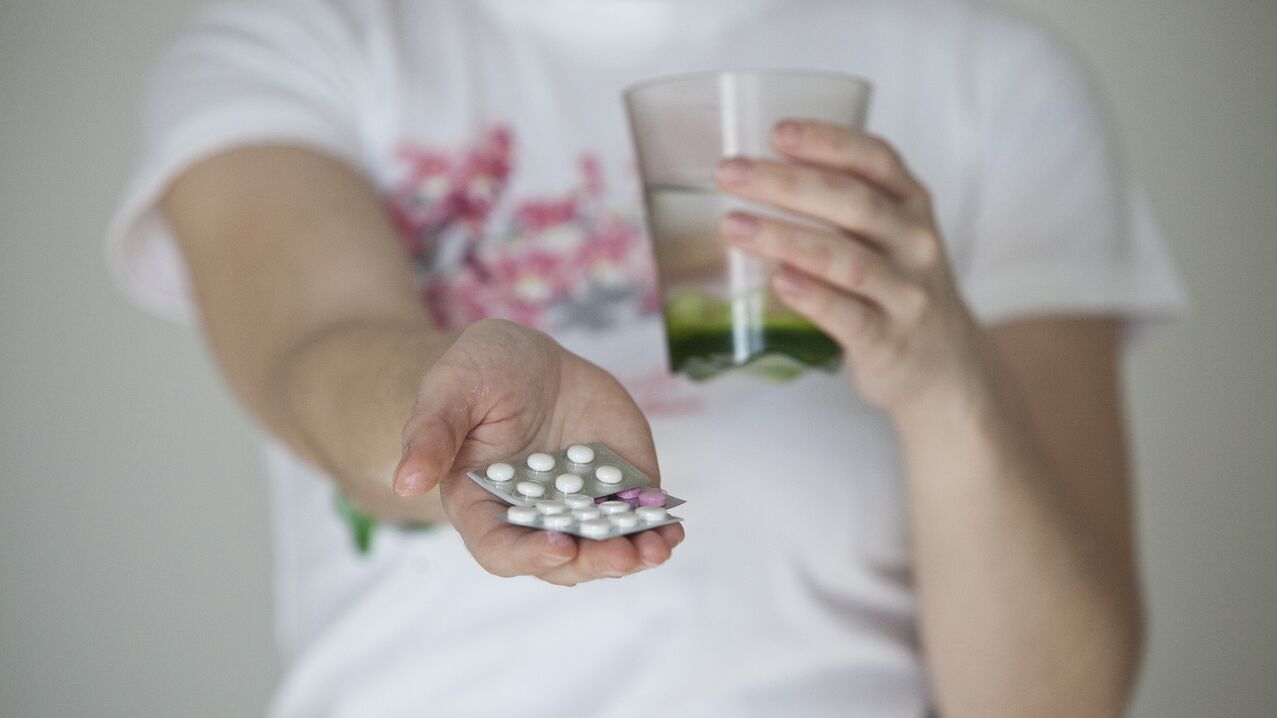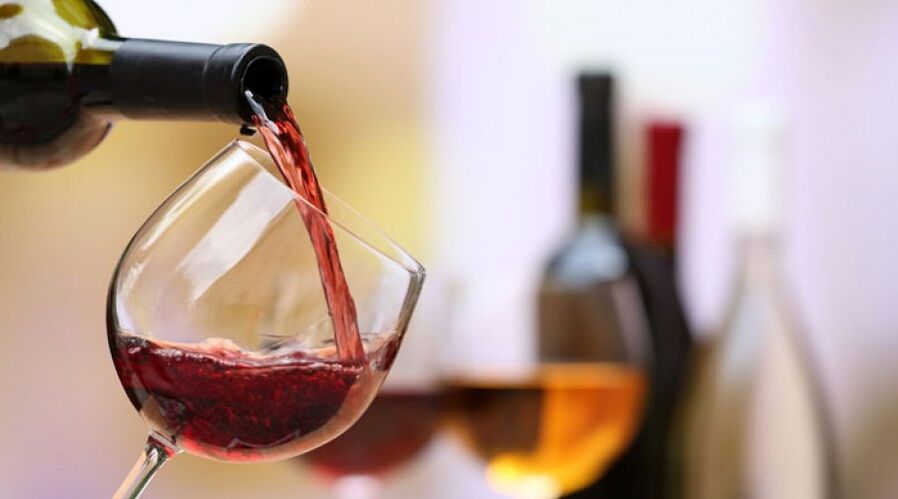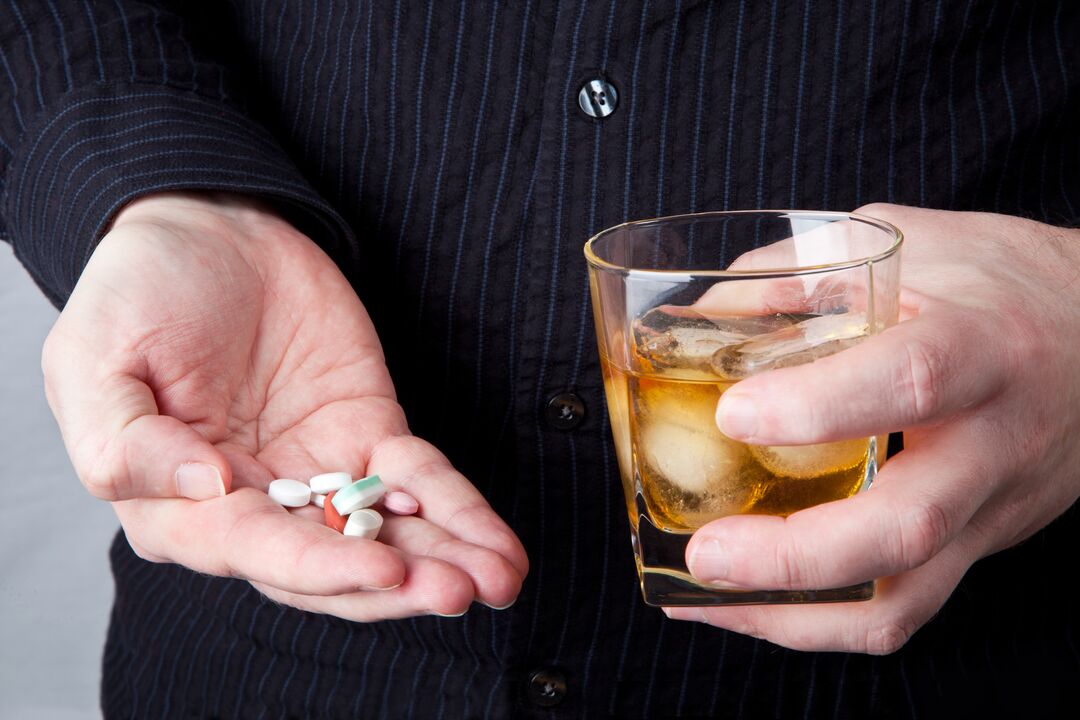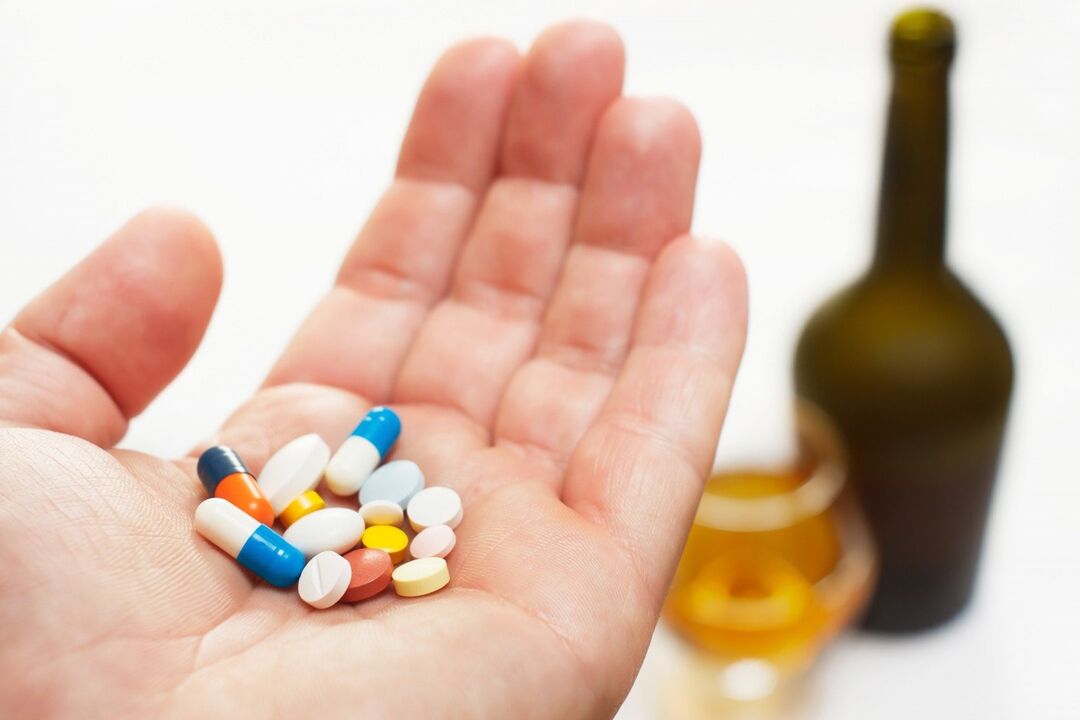
Scientists say the active ingredient of antibiotics is present in the body for at least 3 days. Some medications are long-acting (long) and they are only removed after 2-3 weeks. Consultation with a doctor can help prevent side effects. Before starting to drink alcohol after taking antibiotics, it is important to pay attention to the following parameters:
- the duration of the drug treatment course;
- its compatibility with ethanol;
- The amount of time alcohol is allowed after the last dose.
Mixing drugs with alcohol
In the opinion of some doctors, taking antibiotics while drinking alcohol can lead to liver dysfunction, as well as reduce the effectiveness of the drug to almost nothing.
Other experts speak only of four hours of abstinence, ensuring that at the end of this time, the drug has completed its active phase and drinking alcohol does not affect health in any way.
what happens if you mix it with alcohol
Antibiotics are used to treat many diseases. During therapy, many events occur: birthdays, company parties, weddings, and other events. Therefore, many people are concerned about how much alcohol they should not drink after antibiotics. Let us consider this issue in more detail.
interaction
To know if you can drink alcohol after antibiotics, you need to understand the interaction of drugs and alcoholic beverages.
Anything that enters the body begins to be digested. First is the disintegration into its constituent parts, followed by the complete breakdown of the matter. Only the original elements are preserved. These are carbohydrates, proteins, fats.
If you drink alcohol after antibiotics, the decay products of the alcohol product will also split. If the drug is not completely removed from the blood at this point, its residue can dock with the decaying products of alcohol. The resulting mixture can cause the internal organs to malfunction.
Drinking alcohol after taking antibiotics can cause the following problems:
- The load on the liver increases several times, so the natural filter cannot cope with the overload;
- Allergic reactions of different nature;
- Mental health problems will start;
- Dizziness and vomiting.
If you drink alcohol after taking antibiotics, how the reaction will manifest depends on the type of specific drug, the amount of alcohol consumed, the age and sex of the person, and the individual characteristics of the body.
It's safe to say that you can't drink alcohol after antibiotics. This rule also applies to those drugs whose notes do not directly indicate incompatibility with alcohol-containing products. If you drink alcohol after taking antibiotics, the mildest side effect will be not having the intended treatment effect.
Although alcohol-containing products are essential for all important activities, drinking alcohol after antibiotics is not acceptable.
Drinking alcohol while taking antibiotics can have serious and irreversible consequences. The main negative reactions to this combination include:
- Increases the resistance of pathogenic microbial communities. Antibacterial drugs are used to destroy pathogenic microorganisms in the human body. At the same time, alcohol weakens the effect of these drugs, at which point the bacteria adapt and adapt to the active substance, increasing their resistance to this group of antibiotics.
- The transition from an acute form of a disease to a chronic one. Alcohol accelerates the metabolism of active substances, while drugs break down faster, leaving no time to act on the focal point of inflammation. For this reason, doctors prescribe double doses of antibiotics, which increases the burden on the body and makes the treatment of the disease longer and more difficult.
- Combined use of alcohol and antibiotics increases blood viscosity, which can lead to stroke or myocardial infarction, as well as problems with heart and blood vessel function.
- Decreased drug concentration due to the use of alcoholic beverages. At the same time, doctors increase the dose of antibiotics, and under such a load, both the liver and kidneys are wearing out. Perhaps the development of acute insufficiency of these organs.
- Impaired liver function. Ethanol and antibiotics are broken down by the same liver enzymes. Under such influence, the production of these substances can be completely stopped, which will lead to severe organ poisoning and depression.
- Risk of serious allergic reaction. The human body may not respond adequately to this complex effect. Anaphylactic shock or angioedema with fatal consequences is an irreversible result of the interaction of alcohol and antibiotics.
- Particularly dangerous is the disulfiram-like reaction, which occurs due to the accumulation of acetaldehyde (an intermediate metabolite of ethanol) in tissues and organs, which has a strong nootropic effect on the central nervous system. Its excretion is disturbed, in this context severe poisoning occurs, accompanied by: nausea, vomiting, palpitations, sweating, fever, drop in blood pressure, abdominal pain, dizziness and convulsions.
Compatible drugs
Among antimicrobials, there are different classes of drugs that can be used in combination with alcoholic beverages:
- cephalosporins;
- Penicillin series preparations;
- Macrolides.
If you are taking medicines containing penicillin, you can drink alcohol no earlier than 4 hours after completing a course of antibiotics. This time is sufficient for the drug to be completely absorbed into the blood and broken down in the liver, which marks the realization of the therapeutic function and the beginning of the process of renal clearance of drug residues.
If you start drinking earlier than this period, or drink too much, the treatment effect will not follow. The truth is that high amounts of ethanol increase the production of liver enzymes that begin to actively break down not only the alcohol, but the drug itself.
This, in turn, helps clear the drug from the body quickly, so the drug doesn't have time to perform its function. In addition, alcohol has a diuretic effect, which also helps reduce the concentration of the drug, reducing its effectiveness to zero.
But there is a group of antibacterial drugs that should not be taken with or immediately before alcohol. This can be explained by such antibiotics preventing the production of enzymes that break down ethanol.
This group of drugs has similar effects on the body as drugs and is used to code alcohol-dependent patients.
Antibacterial treatment with drugs with similar properties requires complete refusal of alcohol. Violation of this rule can have serious consequences up to the death of the patient.
There are tons of antibacterials that cannot be combined with any alcohol. These drugs include:
- Nitroimidazoles. High risk of disulfiram-like reactions (alcohol ingestion possible only after 2 days).
- Fluoroquinolones can depress the nervous system until coma when combined with alcohol, which should only be used after 36 hours.
- When interacting with ethanol, cephalosporins produce a disulfiram-like reaction, and alcohol can be taken 24 hours later (in patients with renal disease, the interval is prolonged).
- Tetracycline damages liver cells in the long term, and they are excreted from the body no earlier than 3 days after drinking alcohol.
- Aminoglycosides are ototoxic and nephrotoxic, increase the side effects of the drug, and allow alcohol to be taken no earlier than 2 weeks later.
- Lincosamide affects the central nervous system and liver, causing a disulfiram reaction, and alcohol is only allowed after 4 days.
- Macrolides can cause cirrhosis of the liver. It is excreted very slowly from the body, say alcoholic beverages are only ingested after 4 days.
- Anti-tuberculosis drugs cause drug-induced hepatitis to develop into a fulminant course, and alcohol consumption is strictly prohibited.
When to drink alcohol after antibiotics: general rules
Adhering to the correct intake of antibiotics will help heal the disease faster without the risk of adverse effects. basic rules:
- Only take medicines as directed by your doctor (self-medication is bad for your health);
- Be sure to pay attention to the exact dose and timing of antibiotics;
- The duration of medication will be determined by the doctor. The average is 5 to 15 days, and the long-acting drug is 1 to 4 days;
- You need to drink the tablet with clean non-carbonated water, chamomile soup, unsweetened hot tea;
- During antibiotic treatment, it is best to avoid fatty foods, which slow the absorption of active substances from the gut into the blood. Be sure to consume animal protein in the form of chicken, rabbit, or turkey. limit the amount of fast carbohydrates;
- Absolute contraindications: drinking alcohol after antibiotics if less than 3 days.
Today, when it comes to viral infections, antibiotics are an integral part of treatment. This raises the question of when to drink alcohol after antibiotics. Antibiotics are used to fight most viruses and bacteria known to modern medicine. What should I do if I drink alcohol after taking antibiotics?
The duration of antibiotic treatment usually varies from a few days to several months, depending on the complexity of the disease. No alcohol is allowed during this period. Adjust your intake of other heavy foods. When using alcohol after antibiotics, your doctor cannot guarantee that you will get the most out of your course of treatment, and, in addition, complications often arise.

After a while, you can start drinking alcohol after taking antibiotics. Do not drink alcohol during treatment. The number of days to wait before drinking alcohol varies by medication.
Why are alcohol and antibiotics incompatible things? The truth is that taking antibiotics automatically reduces the activity of your internal organs, which not only fights infections but also cleans up your body after drinking alcohol.
Drinking alcohol during antibiotic treatment can mean damage to your liver, kidneys and heart. After antibiotics, the natural flora of the gut is severely depleted. If you drink in this state, you will find yourself in a hospital bed.
If you drink alcohol directly after taking the pill, without waiting, you will experience the following side effects:
- liver failure;
- nausea and vomiting;
- Headache;
- Dizziness;
- Blurred mind.
These are the main reasons why alcohol is only allowed a few days after the course is over after taking antibiotics.
Abstinence period
Of course, the question of how long it will take to start drinking after taking antibiotics should be asked by your doctor. If you forgot to ask your doctor and you can't reach him now, see the notes that come with the remedy. Read it carefully for information on the duration of dosing, the compatibility of the drug with alcohol, and the time period during which you can drink alcohol.

Most of the time, when asked how many days you can go back to your "drinking" life, the answer is days. Abstinence periods ranged from three days to a week. No matter what specific remedy is used and how long it takes to completely withdraw from the body.
Even if the instructions don't say whether it's okay to drink alcohol after antibiotics, it's best to postpone the celebration for a few days. The key is not only the compatibility of drugs and alcohol, but also the fragile body. Even the smallest dose could be a serious poison for him.
Forbidden
Strictly abstaining from alcohol during a course of antibiotics is not a doctor's whim. Even if you don't notice any side effects when combining the two ingredients, that doesn't mean your body isn't damaged.
The combination of ethanol and the drug does not necessarily have a direct effect. However, the therapeutic properties of the drug are reduced. Therefore, the disease is not defeated and additional courses are required, which will severely affect the liver and many other organs related to the excretory system.
There is a whole group of antibiotic drugs that are strictly forbidden to be combined with alcohol. Notes for such drugs always point to a lack of compatibility with ethanol. In addition, doctors will issue appropriate warnings to patients.
In particular, alcohol is strictly prohibited if you are taking tetracyclines. They are widely used in medicine to treat various infections. The preparations of the levolecithin group are not combined with ethanol because they can cause serious side effects. When combined with alcohol, the toxic effects of the drug are enhanced.
Cephalosporins are also powerful drugs, if taken at the same time as alcohol, the body will be seriously poisoned, which is not conducive to the rapid cure of the disease. In the group of drugs that prohibit alcohol, there are antibiotics against tuberculosis and leprosy, as well as macrolides, which when combined with alcohol increase its toxicity. First, in this case, the brain and liver are affected.
time frame

There are antibiotics, in the instructions you will not find information about compatibility with ethanol. These are antifungal drugs, penicillin drugs.
As mentioned above, this gap in the instructions does not give the green light for drinking. Consider your body's personality. For some, the combination of alcohol and antibiotics causes only mild intoxication and, for some, the potential for death.
In this case, the minimum period of abstinence is three days. Of course, if you have any questions, it is best to contact your doctor, who will explain the answers to your questions.
Admission Rules
You need to take antibiotics correctly to improve the effectiveness of your treatment and reduce the likelihood of side effects. Antibiotics should only be prescribed by a doctor; tests are done beforehand to help the doctor determine the most appropriate antibiotic.
Buying antibiotics on your own may cause side effects or be ineffective at all.
The use of antibiotics is strictly regulated. For example, when using antibiotics twice a day, it is best to extend the interval between doses to 12 hours. Usually, one tablet maintains the desired concentration of the substance in the blood during this time.
Meat is best eaten cooked, while choosing chicken or turkey for stews. It is important to follow a drinking protocol. Typically, a person needs 30 ml per kilogram of body weight.
However, intoxication syndrome rises during illness, so it is recommended to increase the consumption per liter.
Remember that high temperatures can increase your body's need for fluids. In addition, it is actively used to remove bacterial decay products from the body.
In the event of a contagious disease, be sure to take sick leave. Exercise is excluded, and bed rest is recommended in some cases. If you can't lie down all day, get out and about. You should only use antibiotics in combination with other medicines as directed by your doctor.
when can you drink
The time to completely eliminate antibiotics from the body is strictly up to the individual. For example, aminoglycosides are removed from the circulation after 2. 5 hours.
After taking the last pill, the same substance in the fluid in the ear leaves the body only after 14-15 days. Drinking alcohol before this can cause serious problems and even complete deafness.
The duration of the "abstinence" period depends on the type of drug, the patient's age, his health and metabolic profile. In some cases, alcohol can be used 1-1. 5 days after the course of treatment, while in other cases it may take 3-10 days to absolutely refuse alcohol.
Only a doctor can determine how many days after taking antibiotics you can drink alcohol. Many experts believe that you can enjoy a delicious wine (or stronger) just 10 days after completing a therapy session.
For patients with liver, kidney, and other organ disease, these times may be extended based on your doctor's personal recommendations.
In addition, there are a number of factors that support an absolute refusal to drink alcohol during treatment and immediately after treatment:
- During this time, the body weakened by the infection is more susceptible to antibiotics, which have negative effects on the kidneys, liver and heart. In addition, the drug damages the gastrointestinal tract by inhibiting its microflora. If you add alcohol to it, the body may simply not be able to handle the load, threatening the development of acute kidney failure and liver failure.
- Antibiotic treatment was nearly 100% less effective when alcohol was consumed at the same time. The truth is that the pathogenic microbes that antibiotics are designed to shame will lose their sensitivity to the drug and remain immune to its effects. Repeated violations of an alcohol abstinence program can render the entire treatment ineffective, potentially resulting in the patient's death.
These are the main reasons why you should stop drinking alcohol during and immediately after treatment. In fact, some pathogenic bacteria remain active for a period of time, and the weakening of the drug effect will contribute to the further development of the pathogenic flora.
add up
- During this time, the body weakened by the infection is more susceptible to antibiotics, which have negative effects on the kidneys, liver and heart. In addition, the drug damages the gastrointestinal tract by inhibiting its microflora. If you add alcohol to it, the body may simply not be able to handle the load, threatening the development of acute kidney failure and liver failure.
- Antibiotic treatment was nearly 100% less effective if alcohol was consumed at the same time. The truth is that the pathogenic microbes that antibiotics are designed to shame will lose their sensitivity to the drug and remain immune to its effects. Repeated violations of an alcohol abstinence program can render the entire treatment ineffective, potentially resulting in the patient's death.
- How many days after taking antibiotics you can drink alcohol will be determined by your doctor based on the type and nature of the disease course, the patient's age and physical characteristics.
- Light alcoholic beverages (such as wine) can be consumed 3-5 days after the course of treatment, strong beverages - no earlier than 10 days later.
- Violation of the recommended period of abstinence can have serious consequences, up to the death of the patient.































